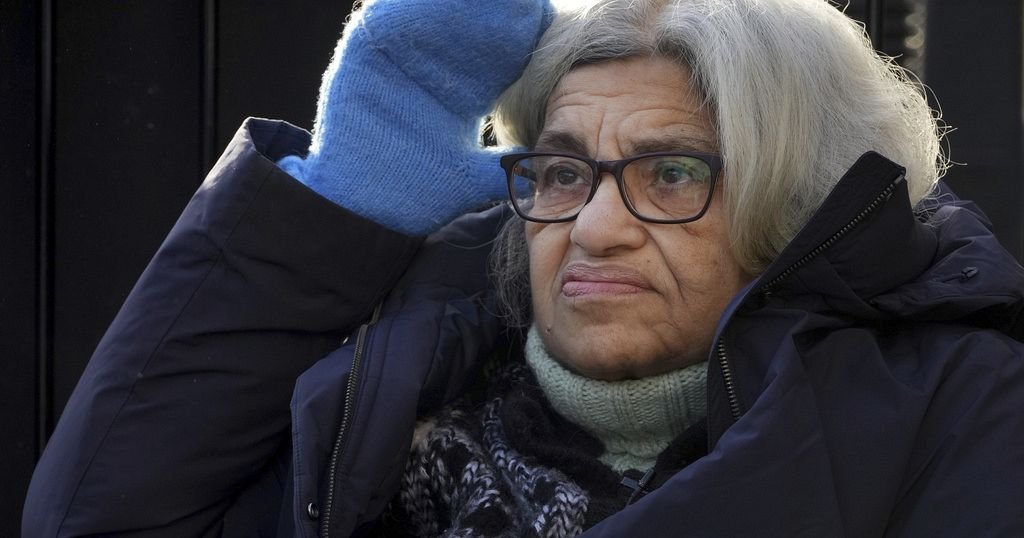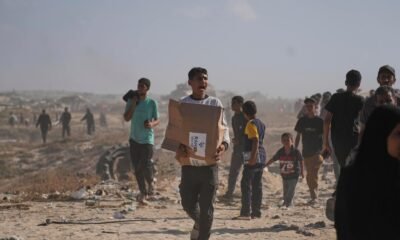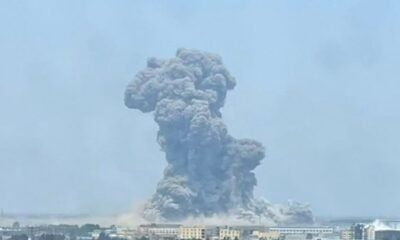Africa
WFP cuts food rations as new refugee arrivals test its Burundi operations

The sharp increase in refugees in need of aid has placed a significant strain on WFP food assistance programmes in Burundi.
Since January 2025, nearly 70,000 people – mainly women, children and the elderly – have fled fighting in DRC to Burundi, many making dangerous river crossings and walking long distances in search of safety.
More continue to arrive each day, adding to what is already the largest influx into Burundi in decades. Cross border movement into DRC’s other neighbours, including Rwanda, Uganda and Tanzania, is also increasing due to the escalating conflict in the country’s east and this threatens to worsen hunger across the region.
“Refugees are arriving every day, some weighed down with hastily packed bundles and suitcases, and others with nothing but the clothes on their backs,” said Dragica Pajevic, WFP’s Deputy Regional Director for eastern Africa, who is currently on the ground supporting operations in Burundi.
“The number of refugees has doubled in just a few weeks, but funding has not kept pace. Our available resources are stretched beyond capacity, and we are being forced to adapt our operations and reduce rations to reach as many people as possible.”
Of the 70,000 people who have arrived in Burundi from DRC in recent weeks, 60,000 have been registered for food assistance, doubling WFP’s total refugee caseload to 120,000 in just a few weeks.
WFP is providing hot meals to the new Congolese refugees, who are housed in temporary transit camps, schools, churches and sports stadiums.
Meanwhile, WFP’s existing refugees are receiving food rations – provided as a mix of in-kind food and cash. But to stretch limited resources, WFP was forced in March to reduce rations for existing refugees from 75 percent to 50 percent.
WFP currently only has the funds to sustain operations for 120,000 refugees through June. Without additional financial support, WFP will be forced to suspend food assistance entirely from July – or even earlier as refugee numbers continue to increase as conflict in eastern DRC intensifies.
The agency urgently needs US$19.8 million to maintain adequate support to the most vulnerable until the end of the year.
Africa
DR Congo Justice Minister under fire over $19M transfer

In the Democratic Republic of Congo, pressure is mounting on Justice Minister Constant Mutamba after explosive allegations over a multi-million dollar no-bid contract and suspicious fund transfers.
On Tuesday, lawmakers grilled the Attorney General for six hours and Mutamba for five. The focus: a $29 million deal awarded without competition, and a $19 million payment to Zion Construction—wired just one day after the company opened its bank account.
The funds didn’t come from the state treasury, but from FRIVAO, the agency managing $325 million in war reparations from Uganda. That agency falls under Mutamba’s direct authority. Defending himself, the minister admitted to “errors” and asked for forgiveness—but claimed he’s the target of political revenge.
He also blamed tensions with Prime Minister Judith Suminwa for a toxic work climate. Lawmakers say the accusations are serious, and the judiciary must be allowed to act. Mutamba’s future in government now hangs in the balance.
Africa
U.K-Egypt: Mother of jailed activist hospitalised amid hunger strike

The mother of a pro-democracy activist imprisoned in Egypt is seriously ill in a London hospital after resuming a hunger strike aimed at pressing for her son’s release, her family said Friday. Laila Soueif was admitted to St Thomas’s Hospital on Thursday night with dangerously low blood sugar levels. “The bottom line is, we’re losing her,” her daughter, Sanaa Souief, said outside the hospital. She added: “(Prime Minister) Keir Starmer needs to act now. Not tomorrow, not Monday, now, right now.”
Laila Soueif has been on hunger strike since September 29 to protest the imprisonment of Alaa Abdel-Fattah, a British-Egyptian dual national who has been in prison in Egypt since September 2019. He was sentenced in December 2021 to five years in prison for spreading false news and should have been released last year, but Egyptian authorities refused to count the more than two years he had spent in pre-trial detention and ordered him held until January 2027.
Laila Souief spent weeks camped outside Britain’s Foreign Office and the prime minister’s Downing Street office to highlight her son’s case. She was previously admitted to hospital in February, with doctors warning she was at “high risk of sudden death.” She agreed in early March to move to a partial hunger strike after Starmer pledged to press Egypt to release her son. She resumed her full hunger strike on May 20, saying: “Nothing has changed, nothing is happening.”
The family says Souief has lost 42% of her bodyweight during the 242-day hunger strike. They say she has received glucagon treatment, which induces the liver to break down stored fat to obtain glucose, but continues to refuse glucose, which would provide her with calories. Abdel-Fattah has been on his own hunger strike for 90 days following his mother’s admission to hospital in February. Thousands of critics of Egyptian President Abdel Fattah el-Sissi have been locked up under dire conditions after unjust trials, human rights groups say.
The British government said that Starmer raised Abdel-Fattah’s case in a call with the Egyptian president last week, and Middle East Minister Hamish Falconer discussed it with Egypt’s Foreign Minister Badr Abdelatty on Sunday. “We are concerned to hear of Laila’s hospitalization. We remain in regular contact with Laila and her family and have checked on her welfare,” the Foreign Office said in a statement. “We are committed to securing Alaa Abdel-Fattah’s release and continue to press for this at the highest levels of the Egyptian government.”
Africa
Deadly floods sweep Nigeria | Africanews

Torrents of predawn rain unleashed flooding that killed at least 150 people in a market town where northern Nigerian farmers sell their wares to traders from the south, officials said Friday as they predicted that the death toll would grow. The Nigerian Hydrological Services Agency did not immediately say how much rain fell after midnight Thursday in the town of Mokwa, which sits in the state of Niger more than 180 miles (300 kilometers) west of Abuja, capital of Africa’s most populous nation. Communities in northern Nigeria have been experiencing prolonged dry spells worsened by climate change and excessive rainfall that leads to severe flooding during the brief wet season. In videos and photos on social media, floodwaters covered neighborhoods and homes were submerged, with their roofs barely visible above the brown currents. Waist-deep in water, residents tried to salvage what they could, or rescue others. Mokwa, nearly 380 kilometers (236 miles) west of Abuja, is a major meeting point where traders from the south buy beans, onions and other food from farmers in the north. A community leader from the Mokwa local government Area, Alhaji Aliki Musa, says this type of flood is seasonal and its not ordinary. “The water is like spiritual water which used to come but it’s seasonal…there’s not much water in Mokwa that will bring that flood,” he said. In September, torrential rains and a dam collapse in the northeastern city of Maiduguri caused severe flooding that left at least 30 people dead and displaced millions, worsening the humanitarian crisis caused by the Boko Haram, a self-proclaimed jihadist militant group based in northeastern Nigeria.
-

 Africa4 days ago
Africa4 days agoSurvivor of Liverpool car ramming talks of shock and panic
-

 Sports3 days ago
Sports3 days agoThe Knicks are bringing hope and title dreams back to New York after years in the doldrums
-

 Lifestyle3 days ago
Lifestyle3 days agoChildren and careers: Talking to kids about what they want to be when they grow up
-

 Lifestyle4 days ago
Lifestyle4 days agoHow to decorate a patio, balcony or other small outdoor space
-

 Lifestyle3 days ago
Lifestyle3 days agoFaizan Zaki hopes to go from spelling bee runner-up to champ
-

 Middle East4 days ago
Middle East4 days agoHajj pilgrimage in Saudi Arabia to begin on June 4 | Religion News
-

 Middle East4 days ago
Middle East4 days agoGaza’s aid system isn’t broken. It’s working exactly as designed | Humanitarian Crises
-

 Asia5 days ago
Asia5 days agoHuge blast rocks Chinese chemical plant, authorities launch rescue operation




